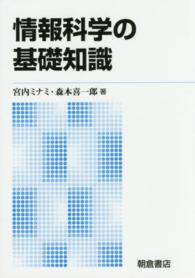基本説明
New in paperback. Hardcover was published in 2008.
Full Description
A study in contrasts, the career of Sergey Prokofiev spanned the globe, leaving him witness to the most significant political and historical events of the first half of the twentieth century. In 1918, after completing a program of studies at the St. Petersburg conservatory, Prokofiev escaped Russia for the United States and later France where, like most émigré artists of the time, he made Paris his home. During these hectic years, he composed three ballets and three operas, fulfilled recording contracts, and played recitals of tempestuous music. Scores were stored in suitcases, scenarios and librettos drafted on hotel letterhead. The constant uprooting and transience fatigued him, but he regarded himself as a person of action who, personally and professionally, traveled against rather that with the current. Thus, in 1936, as political anxieties increased in Western Europe, Prokofiev escaped back to Russia. Though at first pampered by the totalitarian regime, Prokofiev soon suffered official correction and censorship. He wrote and revised his late ballets and operas to appease his bureaucratic overseers but, more often than not, his labors came to naught. Following his official condemnation in 1948, many of his compositions were withdrawn from performance. Physical illness and mental exhaustion characterized his last years. Housebound, he journeyed inward, creating a series of works on the theme of youth whose music sounds despondently optimistic.
The reasons for Prokofiev's return to Russia and the specifics of his dealings with the Stalinist regime have long been mysterious. Owing to their sensitive political and personal nature, over half of the Prokofiev documents at the Russian State Archive have been sealed since their deposit there in 1955, two years after Prokofiev's premature death. The disintegration of the Soviet Union did not lead to the rescinding of this prohibition. Author Simon Morrison is the first scholar, non-Russian or Russian, to receive the privilege to study them. Alongside wholly or partly unknown score materials, Morrison has studied Prokofiev's never-seen journals and diaries, the original, unexpurgated versions of his official speeches, and the bulk of his correspondence. This new information makes possible for the first time an accurate study of the tragic second phase of Prokofiev's career. Moving chronologically, Morrison alternates biographical details with discussions of Prokofiev's major works, furnishing dramatic new insights into Prokofiev's engagement with the Stalinist regime and the consequences that it had for his family and his health.
Contents
INTRODUCTION








